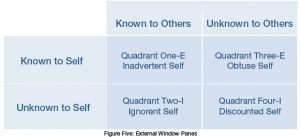
External (E) Panes
Quad 1-E: Inadvertent Self
What I share (and know I share) with other people over which I have little or no control.
Quad 2-E: Ignorant Self
What I don’t know about myself that other people do know and I don’t know that they know.
 Quad 3-E: Obtuse Self
Quad 3-E: Obtuse Self
That of which I am unaware that other people don’t know about me.
Quad 4-E: Discounted Self
Aspects of myself that I don’t know are a part of my self.
Interaction between Internal and External Panes
The gap between internal and external panes is critical. When the gap is large we find three interrelated problems. First, the behavior of the person with the gap is likely to be unpredictable. Shifts in behavior can be quite dramatic, depending on the specific circumstances in which this person finds herself. She is governed at one moment by her own will and at another moment by someone else’s will or by external exigencies. For example, a women whom I have coached (I will call her Elizabeth) often exhibits nonverbal behavior of which she is aware, but which is discrepant with what she says, particularly with regard to her sense of self-confidence. In her words (Quad One-I), Elizabeth conveys a strong sense of self and presents very clear directions and offers readily understood time lines and criteria for successful completion of her subordinates’ tasks.








